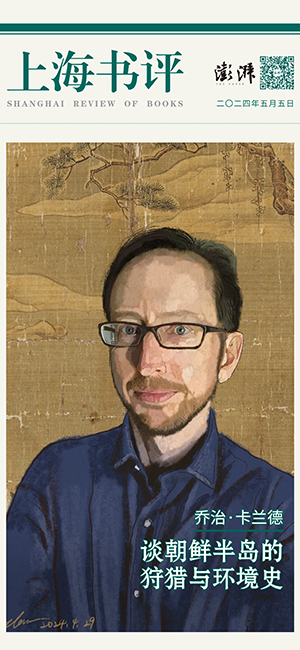George Kallander Discusses His Latest Research on Human-Animal Relations in Shanghai Review of Books
May 17, 2024
Shanghai Review of Books
The Shanghai Review of Books, a prestigious scholarly and literary journal in China, published an extensive interview about Professor of History George Kallander's latest research on human-animal relations, the hunt and environmental history, as well as his past research on Korea and East Asia.

To highlight the relevance of his work, Kallander was on the cover of the edition of the book review. The interview, written by Jing Liu ’19 Ph.D. (Hist) and translated into Chinese, introduces Kallander and his research to a wide Chinese audience.
The interview includes questions about Kallander's three books; strategies for research and writing historical monographs on premodern and early modern history; the intersection of hunting, masculinity, royal authority, international relations and political power in his most recent book; his latest research project on human-animal relations in the seventeenth and eighteenth centuries; and the relevance of conducting research on animals and the environment in premodern and modern societies.
Following is an excerpt of the interview:
“Human-animal relations is a new lens to help us examine important historical moments and trends. The same theoretical lens that I use to examine a premodern society can be applied to modern history of this region. In fact, so much can be accomplished, and an even deeper and more nuanced study of the relationship between animals and humans and how they impacted each other and shaped Korea and this region can be undertaken for the modern period.
Many more sources and many different types of materials are preserved and passed down, so we have access to a lot more. However, to fully study this topic in the modern era, scholars need to use visual sources, sources in multiple languages (Korean, Japanese, Chinese, English and other Western languages)…We can take the findings of my research, and the historical lens through which I study premodern Korea and Northeast Asia, and compare and contrast developments to help us understand how a society like Korea thought about animals, interacted with animals, and how animals shaped a particular identity in modern times.”
Note: The article linked in this story remains in the original language of the publication and has not been translated into English. The accuracy of translations using artificial intelligence or translation software cannot be verified.
Related News
School News

Dec 20, 2024
Commentary

Nov 19, 2024
Commentary

Nov 19, 2024
